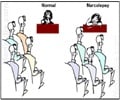A new study says, sleepiness at the wheel and poor sleep quality significantly increase the risk of motor vehicle accidents in adolescents.
A new study says, sleepiness at the wheel and poor sleep quality significantly increase the risk of motor vehicle accidents in adolescents.
The study has been published in the Feb. 15 issue of the Journal of Clinical Sleep Medicine.Results indicate that adolescent drivers were twice as likely to have had a crash if they experienced sleepiness while driving (adjusted odds ratio = 2.1) or reported having bad sleep (OR = 1.9). Eighty of the 339 students had already crashed at least once, and 15 percent of them considered sleepiness to have been the main cause of the crash.
Fifty-six percent of students who had at least one previous crash reported driving while sleepy, compared with 35 percent of subjects who had not been in a crash.
Lead author Fabio Cirignotta, M.D., professor of neurology at the University of Bologna in Italy, said that the only effective countermeasure to drowsiness is to stop driving immediately, pull over to a safe place and nap for 10 to15 minutes.
"Commonly used countermeasures to fatigue, such as opening the window, listening to the radio, or drinking a coffee, are known to be short-lasting and, essentially, useless," said Cirignotta. "Moreover, if a subject perceives sleepiness, he or she would probably already have a reduced performance at the wheel, and nobody can safely detect the real instant when sleep is starting in order to stop driving at that time."
The cross-sectional study was conducted in 2004 and was supported by the Italian Ministry of Education. Self-administered questionnaires were distributed to 339 students who had a river's license and were in their last two years of attendance at one of seven high schools in Bologna. Students were between the ages of 18 and 21 years (mean 18.4 years), and 58 percent of hem were male.
Advertisement
TRI















